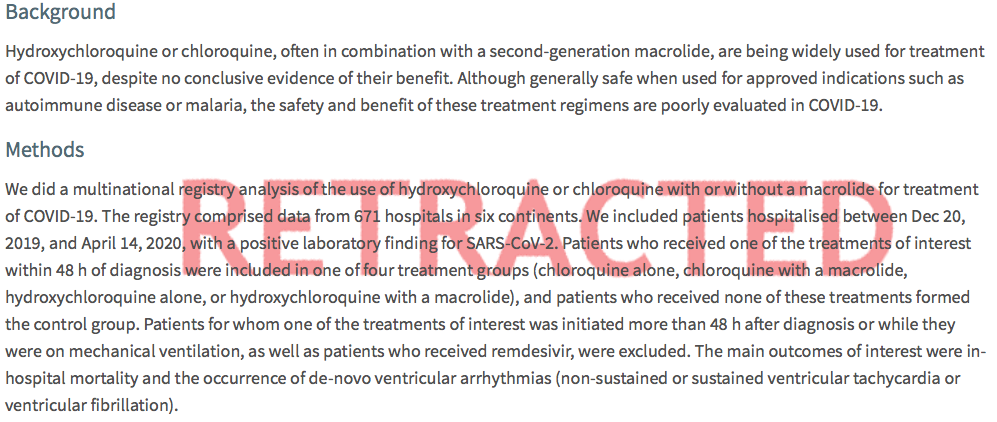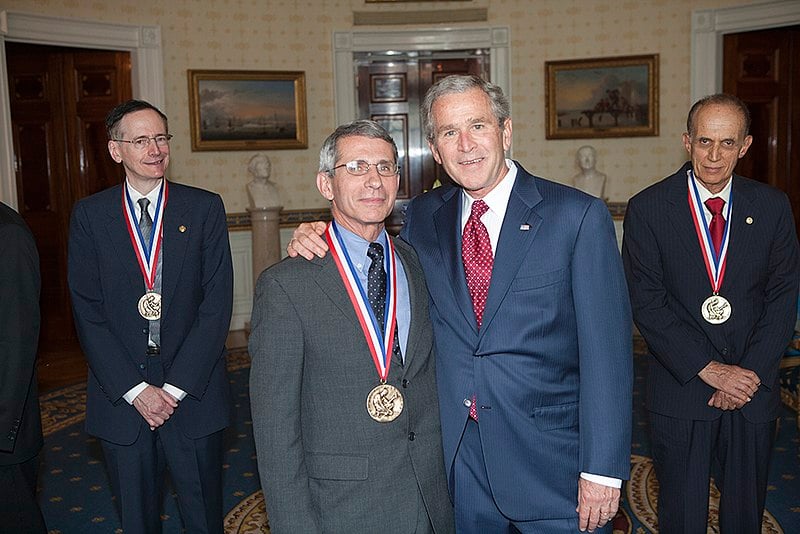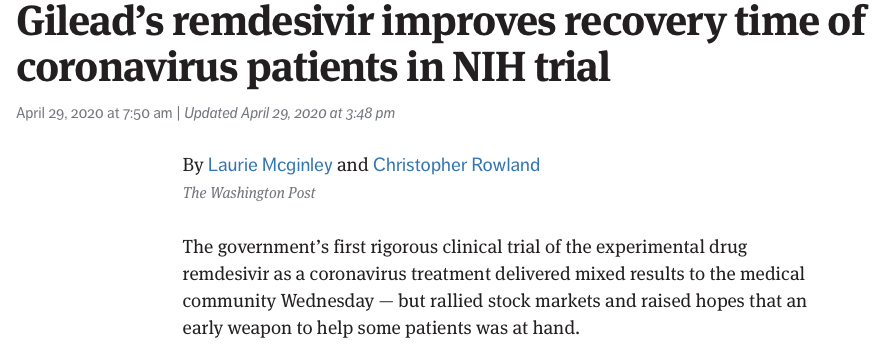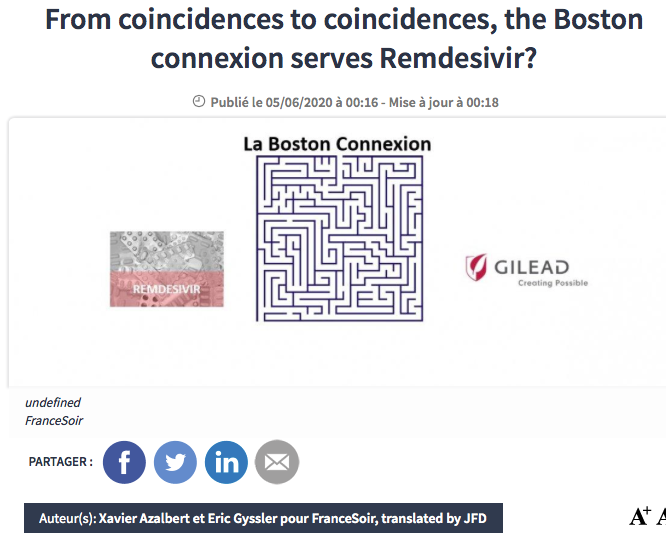LancetGate: “Scientific Corona Lies” and Big Pharma Corruption. Hydroxychloroquine vs. Gilead’s Remdesivir
The Battle to Suppress Hydroxychloroquine as a Cheap and Effective Drug for the Treatment of Covid-19
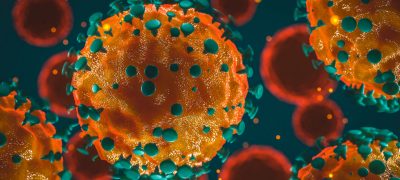
Author’s Note and update
Since this article was first published almost three years year ago on July 11, 2020 under the title LancetGate: “Scientific Corona Lies” and Big Pharma Corruption. Hydroxychloroquine versus Gilead’s Remdesivir on July 3, 2020, there has been a virtual censorship of debate on Hydroxychloroquine (HCQ) and Ivermectin largely directed against medical doctors.
In recent developments Remdesevir is making the headlines. Remdesevir is now approved for babies.
On May 22, 2020 Remdesivir for the Treatment of Covid-19 — Preliminary Report by National Institute of Allergy and Infectious Diseases, National Institutes of Health, was published by the New England Journal of Medicine, (NEJM)
On June 29, 2020, Dr. Anthony Fauci, who is the head of NIAID granted the “Greenlight” to Gilead Sciences Inc. despite the fact that the study of the new experimental drug was “preliminary”.The NIH-NIAID sponsored report (May 22) was used to justify a major agreement with Gilead Sciences Inc.
A $1.6 billion agreement between the HHS and Gilead Sciences Inc. was announced on June 29th, 2020 despite the fact that NIH NIAID study published in the NEJM was considered “preliminary”. In the late 1990s, Gilead Sciences Inc was headed by Donald Rumsfeld (1997-2001), who later joined the George W. Bush administration as Secretary of Defense (2001-2006).
In recent developments, there is an ongoing campaign to suppress both Hydroxycholoroquine as well as Ivermectin as effective preventive and curative drugs.
The objective has been to sustain the vaccination campaign on behalf of Big Pharma.
A revised version of this article was published as a chapter in the author’s E-book. Free Download. See below
Michel Chossudovsky, Global Research, October 25, 2020, August 10, 2023
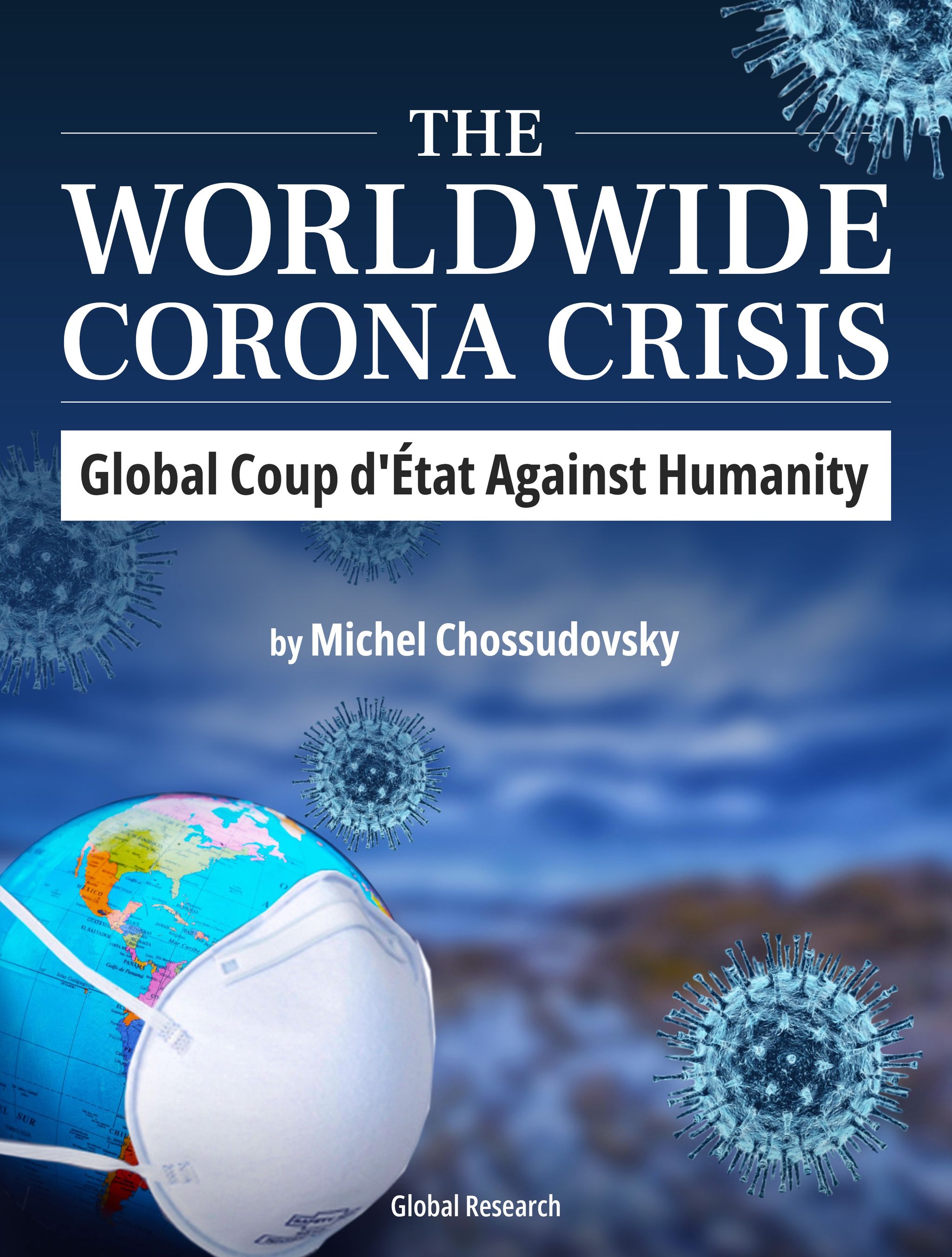 The Worldwide Corona Crisis, Global Coup d’État Against Humanity
The Worldwide Corona Crisis, Global Coup d’État Against Humanity
Destroying Civil Society, Engineered Economic Depression
By Michel Chossudovsky
Translations in several languages are envisaged. The book is available in print form in Japanese. 仕組まれたコロナ危機:「世界の初期化」を目論む者たち
As a means to reaching out to millions of people worldwide whose lives have been affected by the corona crisis, we have decided to distribute the eBook for FREE.
Price: $11.50. FREE COPY Click here to download.
LancetGate: “Scientific Corona Lies” and Big Pharma Corruption. Hydroxychloroquine versus Gilead’s Remdesivir
By Michel Chossudovsky
Introduction
There is an ongoing battle to suppress Hydroxychloroquine (HCQ), a cheap and effective drug for the treatment of Covid-19. The campaign against HCQ is carried out through slanderous political statements, media smears, not to mention an authoritative peer reviewed “evaluation” published on May 22nd by The Lancet, which was based on fake figures and test trials.
The study was allegedly based on data analysis of 96,032 patients hospitalized with COVID-19 between Dec 20, 2019, and April 14, 2020 from 671 hospitals Worldwide. The database had been fabricated. The objective was to kill the Hydroxychloroquine (HCQ) cure on behalf of Big Pharma.
While The Lancet article was retracted, the media casually blamed “a tiny US based company” named Surgisphere whose employees included “a sci-fi writer and adult content model” for spreading “flawed data” (Guardian). This Chicago based outfit was accused of having misled both the WHO and national governments, inciting them to ban HCQ. None of those trial tests actually took place.
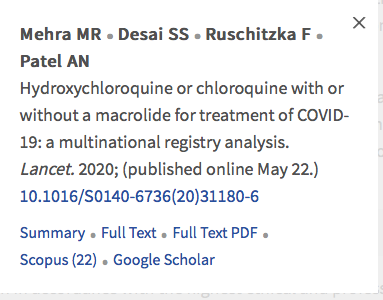 While the blame was placed on Surgisphere, the unspoken truth (which neither the scientific community nor the media have acknowledged) is that the study was coordinated by Harvard professor Mandeep Mehra under the auspices of Brigham and Women’s Hospital (BWH) which is a partner of the Harvard Medical School.
While the blame was placed on Surgisphere, the unspoken truth (which neither the scientific community nor the media have acknowledged) is that the study was coordinated by Harvard professor Mandeep Mehra under the auspices of Brigham and Women’s Hospital (BWH) which is a partner of the Harvard Medical School.
When the scam was revealed, Dr. Mandeep Mehra who holds the Harvey Distinguished Chair of Medicine at Brigham and Women’s Hospital apologized:
I have always performed my research in accordance with the highest ethical and professional guidelines. However, we can never forget the responsibility we have as researchers to scrupulously ensure that we rely on data sources that adhere to our high standards.
It is now clear to me that in my hope to contribute this research during a time of great need, I did not do enough to ensure that the data source was appropriate for this use. For that, and for all the disruptions – both directly and indirectly – I am truly sorry. (emphasis added)
Mandeep R. Mehra, MD, MSC (official statement on BWH website)
But that “truly sorry” note was just the tip of the iceberg. Why?
Studies on Gilead Science’s Remdesivir and Hydroxychloroquine (HCQ) Were Conducted Simultaneously by Brigham and Women’s Hospital (BWH)
While The Lancet report (May 22, 2020) coordinated by Dr. Mandeep Mehra was intended “to kill” the legitimacy of HCQ as a cure of Covid-19, another important (related) study was being carried out (concurrently) at BWH pertaining to Remdesivir on behalf of Gilead Sciences Inc. Dr. Francisco Marty, a specialist in Infectious Disease and Associate Professor at Harvard Medical School was entrusted with coordination of the clinical trial tests of the antiviral medication Remdesivir under Brigham’s contract with Gilead Sciences Inc:
Brigham and Women’s Hospital began enrolling patients in two clinical trials for Gilead’s antiviral medication remdesivir. The Brigham is one of multiple clinical trial sites for a Gilead-initiated study of the drug in 600 participants with moderate coronavirus disease (COVID-19) and a Gilead-initiated study of 400 participants with severe COVID-19.
… If the results are promising, this could lead to FDA approval, and if they aren’t, it gives us critical information in the fight against COVID-19 and allows us to move on to other therapies.”
While Dr. Mandeep Mehra was not directly involved in the Gilead Remdesevir BWH study under the supervision of his colleague Dr. Francisco Marty, he nonetheless had contacts with Gilead Sciences Inc: “He participated in a conference sponsored by Gilead in early April 2020 as part of the Covid-19 debate” (France Soir, May 23, 2020)
What was the intent of his (failed) study? To undermine the legitimacy of Hydroxychloroquine?
According to France Soir, in a report published after The Lancet Retraction:
The often evasive answers produced by Dr Mandeep R. Mehra, … professor at Harvard Medical School, did not produce confidence, fueling doubt instead about the integrity of this retrospective study and its results. (France Soir, June 5, 2020)
Was Dr. Mandeep Mehra in conflict of interest? (That is a matter for BWH and the Harvard Medical School to decide upon).
Who are the Main Actors?
Dr. Anthony Fauci, advisor to Donald Trump, portrayed as “America’s top infectious disease expert” has played a key role in smearing the HCQ cure which had been approved years earlier by the CDC as well as providing legitimacy to Gilead’s Remdesivir.
Dr. Fauci has been the head of the National Institute of Allergy and Infectious Diseases (NIAID) since the Reagan administration. He is known to act as a mouthpiece for Big Pharma.
Dr. Fauci launched Remdesivir in late June (see details below). According to Fauci, Remdesevir is the “corona wonder drug” developed by Gilead Science Inc. It’s a $1.6 billion dollar bonanza.
Gilead Sciences Inc: History
Gilead Sciences Inc is a Multibillion dollar bio-pharmaceutical company which is now involved in developing and marketing Remdesivir. Gilead has a long history. It has the backing of major investment conglomerates including the Vanguard Group and Capital Research & Management Co, among others. It has developed ties with the US Government.
 In 1999 Gilead Sciences Inc, developed Tamiflu (used as a treatment of seasonal influenza and bird flu). At the time, Gilead Sciences Inc was headed by Donald Rumsfeld (1997-2001), who later joined the George W. Bush administration as Secretary of Defense (2001-2006). Rumsfeld was responsible for coordinating the illegal and criminal wars on Afghanistan (2001) and Iraq (2003).
In 1999 Gilead Sciences Inc, developed Tamiflu (used as a treatment of seasonal influenza and bird flu). At the time, Gilead Sciences Inc was headed by Donald Rumsfeld (1997-2001), who later joined the George W. Bush administration as Secretary of Defense (2001-2006). Rumsfeld was responsible for coordinating the illegal and criminal wars on Afghanistan (2001) and Iraq (2003).
Rumsfeld maintained his links to Gilead Sciences Inc throughout his tenure as Secretary of Defense (2001-2006). According to CNN Money (2005): “The prospect of a bird flu outbreak … was very good news for Defense Secretary Donald Rumsfeld [who still owned Gilead stocks] and other politically connected investors in Gilead Sciences”.
Anthony Fauci has been in charge of the NIAID since 1984, using his position as “a go between” the US government and Big Pharma. During Rumsfeld’s tenure as Secretary of Defense, the budget allocated to bio-terrorism increased substantially, involving contracts with Big Pharma including Gilead Sciences Inc. Anthony Fauci considered that the money allocated to bio-terrorism in early 2002 would:
“accelerate our understanding of the biology and pathogenesis of microbes that can be used in attacks, and the biology of the microbes’ hosts — human beings and their immune systems. One result should be more effective vaccines with less toxicity.” (WPo report)
In 2008, Dr. Anthony Fauci was granted the Presidential Medal of Freedom by president George W. Bush “for his determined and aggressive efforts to help others live longer and healthier lives.”
The 2020 Gilead Sciences Inc Remdesivir Project
We will be focussing on key documents (and events)
Chronology
February 21: Initial Release pertaining to NIH-NIAID Remdesivir placebo test trial
April 10: The Gilead Sciences Inc study published in the NEJM on the “Compassionate Use of Remdesivir”
April 29: NIH Release: Study on Remdesivir (Report published on May 22 in NEJM)
May 22, The BWH-Harvard Study on Hydroxychloroquine coordinated by Dr. Mandeep Mehra published in The Lancet
May 22, Remdesivir for the Treatment of Covid-19 — Preliminary Report National Institute of Allergy and Infectious Diseases, National Institutes of Health, New England Journal of Medicine, (NEJM)
June 5: The (fake) Lancet Report (May 22) on HCQ is Retracted.
June 29, Fauci announcement. The $1.6 Billion Remdevisir HHS Agreement with Gilead Sciences Inc
April 10: The Gilead Sciences Inc. study published in the NEJM on the “Compassionate Use of Remdesivir”
A Gilead sponsored report was published in New England Journal of Medicine in an article entitled “Compassionate Use of Remdesivir for Patients with Severe Covid-19” . It was co-authored by an impressive list of 56 distinguished medical doctors and scientists, many of whom were recipients of consulting fees from Gilead Sciences Inc.
Gilead Sciences Inc. funded the study which included several staff members as co-authors.

The testing included a total of 61 patients [who] received at least one dose of remdesivir on or before March 7, 2020; 8 of these patients were excluded because of missing postbaseline information (7 patients) and an erroneous remdesivir start date (1 patient) … Of the 53 remaining patients included in this analysis, 40 (75%) received the full 10-day course of remdesivir, 10 (19%) received 5 to 9 days of treatment, and 3 (6%) fewer than 5 days of treatment.
The NEJM article states that “Gilead Sciences Inc began accepting requests from clinicians for compassionate use of remdesivir on January 25, 2020”. From whom, From Where? According to the WHO (January 30, 2020) there were 82 cases in 18 countries outside China of which 5 were in the US, 5 in France and 3 in Canada.
Several prominent physicians and scientists have cast doubt on the Compassionate Use of Remdesivir study conducted by Gilead, focussing on the small size of the trial. Ironically, the number of patients in the test is less that the number of co-authors: “53 patients” versus “56 co-authors”
Below we provide excerpts of scientific statements on the Gilead NEJM project (Science Media Centre emphasis added) published immediately following the release of the NEJM article:
“‘Compassionate use’ is better described as using an unlicensed therapy to treat a patient because there are no other treatments available. Research based on this kind of use should be treated with extreme caution because there is no control group or randomisation, which are some of the hallmarks of good practice in clinical trials. Prof Duncan Richard, Clinical Therapeutics, University of Oxford.
“It is critical not to over-interpret this study. Most importantly, it is impossible to know the outcome for this relatively small group of patients had they not received remdesivir. Dr Stephen Griffin, Associate Professor, School of Medicine, University of Leeds.
“The research is interesting but doesn’t prove anything at this point: the data are from a small and uncontrolled study. Simon Maxwell, Professor of Clinical Pharmacology and Prescribing, University of Edinburgh.
“The data from this paper are almost uninterpretable. It is very surprising, perhaps even unethical, that the New England Journal of Medicine has published it. It would be more appropriate to publish the data on the website of the pharmaceutical company that has sponsored and written up the study. At least Gilead have been clear that this has not been done in the way that a high quality scientific paper would be written. Prof Stephen Evans, Professor of Pharmacoepidemiology, London School of Hygiene & Tropical Medicine.
“It’s very hard to draw useful conclusions from uncontrolled studies like this particularly with a new disease where we really don’t know what to expect and with wide variations in outcomes between places and over time. One really has to question the ethics of failing to do randomisation – this study really represents more than anything else, a missed opportunity.” Prof Adam Finn, Professor of Paediatrics, University of Bristol.
To review the complete document of Science Media Centre pertaining to expert assessments click here
April 29: The National Institutes of Health (NIH) Study on Remdevisir.
On April 29th following the publication of the Gilead Sciences Inc Study in the NEJM on April 10, a press release of the National Institutes of Health (NIH) on Remdevisir was released. The full document was published on May 22, by the NEJM under the title:
Remdesivir for the Treatment of Covid-19 — Preliminary Report (NEJM)
The study had been initiated on February 21, 2020. The title of the April 29 Press Release was:
“Peer-reviewed data shows remdesivir for COVID-19 improves time to recovery”
It’s a government sponsored report which includes preliminary data from a randomized trial involving 1063 hospitalized patients. The results of the trial labelled Adaptive COVID-19 Treatment Trial (ACTT) are preliminary, conducted under the helm of Dr. Fauci’s National Institute of Allergy and Infectious Diseases (NIAID):
An independent data and safety monitoring board (DSMB) overseeing the trial met on April 27 to review data and shared their interim analysis with the study team. Based upon their review of the data, they noted that remdesivir was better than placebo from the perspective of the primary endpoint, time to recovery, a metric often used in influenza trials. Recovery in this study was defined as being well enough for hospital discharge or returning to normal activity level.
Preliminary results indicate that patients who received remdesivir had a 31% faster time to recovery than those who received placebo (p<0.001). Specifically, the median time to recovery was 11 days for patients treated with remdesivir compared with 15 days for those who received placebo. Results also suggested a survival benefit, with a mortality rate of 8.0% for the group receiving remdesivir versus 11.6% for the placebo group (p=0.059). (emphasis added)
In the NIH’s earlier February 21, 2020 report (released at the outset of the study), the methodology was described as follows:
… A randomized, controlled clinical trial to evaluate the safety and efficacy of the investigational antiviral remdesivir in hospitalized adults diagnosed with coronavirus disease 2019 (COVID-19) …
Numbers. Where? When?
The February 21 report confirmed that the first trial participant was “an American who was repatriated after being quarantined on the Diamond Princess cruise ship” that docked in Yokohama (Japanese Territorial Waters). “Thirteen people repatriated by the U.S. State Department from the Diamond Princess cruise ship” were selected as patients for the placebo trial test. Ironically, at the outset of the study, 58.7% of the “confirmed cases” Worldwide (542 cases out of 924) (outside China), were on the Diamond Cruise Princess from which the initial trial placebo patients were selected.
Where and When: The trial test in the 68 selected sites? That came at a later date because on February 19th (WHO data), the US had recorded only 15 positive cases (see Table Below).
“A total of 68 sites ultimately joined the study—47 in the United States and 21 in countries in Europe and Asia.” (emphasis added)
In the final May 22 NEJM report entitled Remdesivir for the Treatment of Covid-19 — Preliminary Report:
There were 60 trial sites and 13 subsites in the United States (45 sites), Denmark (8), the United Kingdom (5), Greece (4), Germany (3), Korea (2), Mexico (2), Spain (2), Japan (1), and Singapore (1). Eligible patients were randomly assigned in a 1:1 ratio to receive either remdesivir or placebo. Randomization was stratified by study site and disease severity at enrollment
The Washington Post applauded Anthony Fauci’s announcement (April 29):
“The preliminary results, disclosed at the White House by Anthony S. Fauci, … fall short of the magic bullet or cure… But with no approved treatments for Covid-19,[Lie] Fauci said, it will become the standard of care for hospitalized patients …The data shows that remdisivir has a clear-cut, significant, positive effect in diminishing the time to recovery,” Fauci said.
The government’s first rigorous clinical trial of the experimental drug remdesivir as a coronavirus treatment delivered mixed results to the medical community Wednesday — but rallied stock markets and raised hopes that an early weapon to help some patients was at hand.
The preliminary results, disclosed at the White House by Anthony Fauci, chief of the National Institute of Allergy and Infectious Diseases, which led the placebo-controlled trial found that the drug accelerated the recovery of hospitalized patients but had only a marginal benefit in the rate of death.
… Fauci’s remarks boosted speculation that the Food and Drug Administration would seek emergency use authorization that would permit doctors to prescribe the drug.
In addition to clinical trials, remdesivir has been given to more than 1,000 patients under compassionate use. [also refers to the Gilead study published on April 10 in the NEJM]
The study, involving [more than] 1,000 patients at 68 sites in the United States and around the world (??), offers the first evidence (??) from a large (??), randomized (??) clinical study of remdesivir’s effectiveness against COVID-19.
The NIH placebo test study provided “preliminary results”. While the placebo trial test was “randomized”, the overall selection of patients at the 68 sites was not fully randomized. See the full report.
May 22: The Fake Lancet Report on Hydroxychloroquine (HCQ)
It is worth noting that the full report of the NIH-NIAID) entitled Remdesivir for the Treatment of Covid-19 — Preliminary Report was released on May 22, 2020 in the NEJM, on the same day as the controversial Lancet report on Hydroxychloroquine.
Immediately folllowing its publication, the media went into high gear, smearing the HCQ cure, while applauding the NIH-NIASD report released on the same day.
Remdesivir, the only drug cleared to treat Covid-19, sped the recovery time of patients with the disease, … “It’s a very safe and effective drug,” said Eric Topol, founder and director of the Scripps Research Translational Institute. “We now have a definite first efficacious drug for Covid-19, which is a major step forward and will be built upon with other drugs, [and drug] combinations.”
When the Lancet HCQ article by Bingham-Harvard was retracted on June 5, it was too late, it received minimal media coverage. Despite the Retraction, the HCQ cure “had been killed”.
June 29: Fauci Greenlight. The $1.6 Billion Remdesivir Contract with Gilead Sciences Inc
Dr. Anthony Fauci granted the “Greenlight” to Gilead Sciences Inc. on June 29, 2020.
The semi-official US government NIH-NIAID sponsored report (May 22) entitled Remdesivir for the Treatment of Covid-19 — Preliminary Report (NEJM) was used to justify a major agreement with Gilead Sciences Inc.
The Report was largely funded by the National Institute of Allergy and Infectious Diseases (NIAID) headed by Dr. Anthony Fauci and the National Institutes of Health (NIH).
On June 29, based on the findings of the NIH-NIAID Report published in the NEJM, the Department of Health and Human Services (HHS) announced on behalf of the Trump Adminstration an agreement to secure large supplies of the remdesivir drug from Gilead Sciences Inc. for the treatment of Covid-19 in America’s private hospitals and clinics.
The earlier Gilead study based on scanty test results published in the NEJM (April 10), of 53 cases (and 56 co-authors) was not highlighted. The results of this study had been questioned by several prominent physicians and scientists.
Who will be able to afford Remdisivir? 500,000 doses of Remdesivir are envisaged at $3,200 per patient, namely $1.6 billion (see the study by Elizabeth Woodworth)
The Drug was also approved for marketing in the European Union. under the brandname Veklury.
If this contract is implemented as planned, it represents for Gilead Science Inc. and the recipient US private hospitals and clinics a colossal amount of money.

[error in above title according to HHS: $3200]
According to The Trump Administration’s HHS Secretary Alex Azar (June 29, 2020):
“To the extent possible, we want to ensure that any American patient who needs remdesivir can get it. [at $3200] The Trump Administration is doing everything in our power to learn more about life-saving therapeutics for COVID-19 and secure access to these options for the American people.”
Remdesivir versus Hydroxychloroquine (HCQ)
Careful timing:
The Lancet study (published on May 22) was intended to undermine the legitimacy of Hydroxychloroquine as an effective cure to Covid-19, with a view to sustaining the $1.6 billion agreement between the HHS and Gilead Sciences Inc. on June 29th. The legitmacy of this agreement rested on the May 22 NIH-NIAID study in the NEJM which was considered “preliminary”.
What Dr. Fauci failed to acknowledge is that Chloroquine had been “studied” and tested fifteen years ago by the CDC as a drug to be used against coronavirus infections. And that Hydroxychloroquine has been used recently in the treatment of Covid-19 in several countries.
According to the Virology Journal (2005) “Chloroquine is a potent inhibitor of SARS coronavirus infection and spread”. It was used in the SARS-1 outbreak in 2002. It had the endorsement of the CDC. 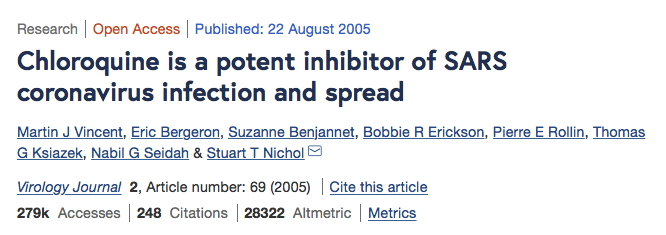
HCQ is not only effective, it is “inexpensive” when compared to Remdesivir, at an estimated “$3120 for a US Patient with private insurance”.
Below are excerpts of an interview of Harvard’s Professor Mehra (who undertook the May 22 Lancet study) with France Soir published immediately following the publication of the Lancet report (prior to its Retraction).
Dr. Mandeep Mehra: In our study, it is fairly obvious that the lack of benefit and the risk of toxicity observed for hydroxychloroquine are fairly reliable. [referring to the May 22 Lancet study]
France Soir: Do you have the data for Remdesivir?
MM: Yes, we have the data, but the number of patients is too small for us to be able to conclude in one way or another.
FS: As you know, in France, there is a pros and cons battle over hydroxychloroquine which has turned into a public health issue even involving the financial lobbying of pharmaceutical companies. Why not measure the effect of one against the other to put an end to all speculation? …
MM: In fact, there is no rational basis for testing Remdesivir versus hydroxychloroquine. On the one hand, Remdesivir has shown that there is no risk of mortality and that there is a reduction in recovery time. On the other hand, for hydroxychloroquine it is the opposite: it has never been shown any advantage and most studies are small or inconclusive In addition, our study shows that there are harmful effects.
It would therefore be difficult and probably unethical to compare a drug with demonstrated harmfulness to a drug with at least a glimmer of hope.
FS: You said that there is no basis for testing or comparing Remdesivir with hydroxychloroquine, do you think you have done everything to conclude that hydroxychloroquine is dangerous?
MM: Exactly. …
All we are saying is that once you have been infected (5 to 7 days after) to the point of having to be hospitalized with a severe viral load, the use of hydroxychloroquine and its derivative is not effective.
The damage from the virus is already there and the situation is beyond repair. With this treatment [HCQ] it can generate more complications
FS Mandeep Mehra declared that he had no conflict of interest with the laboratories and that this study was financed from the endowment funds of the professor’s chair.
He participated in a conference sponsored by Gilead in early April 2020 as part of the Covid-19 debate.
France Soir, translated by the author, emphasis added, May 23, 2020)
In Annex, see the followup article by France Soir published after the scam surrounding the data base of Dr. Mehra’s Lancet report was revealed.
Concluding Remarks
Lies and Corruption to the nth Degree involving Dr. Anthony Fauci, “The Boston Connection” and Gilead Sciences Inc.
The Gilead Sciences Inc. Remdesivir study (50+ authors) was published in the New England Journal of Medicine (April 10, 2020).
It was followed by the NIH-NIAID Remdesivir for the Treatment of Covid-19 — Preliminary Report on May 22, 2020 in the NEJM. And on that same day, May 22, the “fake report” on Hydroxychloroquine by BWH-Harvard Dr. Mehra was published by The Lancet.
Harvard Medical School and the BWH bear responsibility for having hosted and financed the fake Lancet report on HCQ coordinated by Dr. Mandeep Mehra.
Is there conflict of interest? BWH was simultaneously involved in a study on Remdesivir in contract with Gilead Sciences, Inc.
While the Lancet report coordinated by Harvard’s Dr. Mehra was retracted, it nonetheless served the interests of Gilead Sciences Inc.
It is important that an independent scientific and medical assessment be undertaken, respectively of the Gilead Sciences Inc New England Journal of Medicine (NEMJ) peer reviewed study (April 10, 2020) as well as the NIH-NIAID study also published in the NEJM (May 22, 2020).
ANNEX
Retraction by France Soir
The fraud concerning the Lancet Report was revealed in early June. France Soir in a subsequent article (June 5, 2020) points to the Boston Connection: La connexion de Boston, namely the insiduous relationship between Gilead Sciences Inc and Professor Mehra, Harvard Medical School as well as the two related Boston based hospitals involved.
(excerpts here, to access the complete text click here translation from French by France Soir, emphasis in the original article)
The often evasive answers produced by Dr Mandeep R. Mehra, a physician specializing in cardiovascular surgery and professor at Harvard Medical School, did not produce confidence, fueling doubt instead about the integrity of this retrospective study and its results.
… However, the reported information that Dr. Mehra had attended a conference sponsored by Gilead – producer of remdesivir, a drug in direct competition with hydroxychloroquine (HCQ) – early in April called for further investigation
It is important to keep in mind that Dr. Mandeep Mehra has a practice at the Brigham and Women’s Hospital (BWH) in Boston.
That study relied on the shared medical records of 8,910 patients in 169 hospitals around the world, also by Surgisphere.
Funding for the study was “Supported by the William Harvey Chair in Cardiovascular Medicine at Brigham and Women’s Hospital. The development and maintenance of the collaborative surgical outcomes database was funded by Surgisphere.”
The study published on May 22 sought to evaluate the efficacy or otherwise of chloroquine and hydroxychloroquine, alone or in combination with a macrolide antibiotic. …
It is therefore noteworthy that within 3 weeks, 2 large observational retrospective studies on large populations – 96,032 and 8,910 patients – spread around the world were published in two different journals by Dr. Mehra, Dr. Desai and other co-authors using the database of Surgisphere, Dr. Desai’s company.
These two practising physicians and surgeons seem to have an exceptional working capacity associated with the gift of ubiquity.
The date of May 22 is also noteworthy because on the very same day, the date of the publication in The Lancet of the highly accusatory study against HCQ, another study was published in the New England Journal of Medicine concerning the results of a clinical trial of…remdesivir.
In the conclusion of this randomized, double-blind, placebo-controlled trial, “remdesivir was superior to placebo in shortening the time to recovery in adults hospitalized with Covid-19 and evidence of lower respiratory tract infection.”
Concretely: on the same day, May 22nd, one study demeaned HCQ in one journal while another claimed evidence of attenuation on some patients through remdesivir in another journal.
It should be noted that one of the main co-authors, Elizabeth “Libby”* Hohmann, represents one of the participating hospitals, the Massachusetts General Hospital in Boston, also affiliated with Harvard Medical School, as is the Brigham and Women’s Hospital in Boston, where Dr. Mandeep Mehra practices.
Coincidence, probably.
Upon further investigation, we discovered that the first 3 major clinical trials on Gilead’s remdesivir were conducted by these two hospitals:
“While COVID-19 continues to circle the globe with scientists following on its trail, Massachusetts General Hospital (MGH) and Brigham and Women’s Hospital (BWH) are leading the search for effective treatment.
“Both hospitals are conducting clinical trials of remdesivir.”
MGH has joined what the National Institute of Health (NIH) describe as the first clinical trial in the United States of an experimental treatment for COVID-19, sponsored by the National Institute of Allergy and Infectious Diseases, part of NIH. MGH is currently the only hospital in New England to participate in this trial, according to a list of sites shared by the hospital.
” It’s a gigantic undertaking, with patients registered in some 50 sites across the country, getting better.
“The NIH trial, which can be adapted to evaluate other treatments, aims to determine whether the drug relieves the respiratory problems and other symptoms of COVID-19, helping patients leave hospital earlier.**
As a reminder, the NIAID/NIH is led by Antony Fauci, a staunch opponent of HCQ.
Coincidence, probably.
“At the Brigham, two additional trials initiated by Gilead, the drug developer, will determine whether it alleviates symptoms in patients with moderate to severe illness over five- and ten-days courses. These trials will also be randomized, but not placebo controlled, and will include 1,000 patients at sites worldwide. Those patients, noted Francisco Marty, MD, Brigham physician and study co-investigator, will likely be recruited at an unsettlingly rapid clip.”
As a result, the first major clinical trials on remdesivir launched on March 20, whose results are highly important for Gilead, are being led by the MGH and BWH in Boston, precisely where Dr. Mehra, the main author of the May 22nd HCQ trial, is practising.
Small world! Coincidence, again, probably.
Dr. Marty at BWH expected to have results two months later. Indeed, in recent days, several US media outlets have reported Gilead’s announcements of positive results from the remdesivir clinical trials in Boston.:
“Encouraging results from a new study published Wednesday on remdesivir for the treatment of patients with COVID-19.**
Brigham and Dr. Francisco Marty worked on this study, and he says the results show that there is no major difference between treating a patient with a five-day versus a 10-day regimen.
…”Gilead Announces Results of Phase 3 Remdesivir Trial in Patients with Moderate COVID-19
– One study shows that the 5-day treatment of remdesivir resulted in significantly greater clinical improvement compared to treatment with the standard of care alone
– The data come on top of the body of evidence from previous studies demonstrating the benefits of remdesivir in hospitalized patients with IDVOC-19
“We now have three randomized controlled trials demonstrating that remdesivir improved clinical outcomes by several different measures,” Gilead plans to submit the complete data for publication in a peer-reviewed journal in the coming weeks.
These results announced by Gilead a few days after the May 22 publication of the study in the Lancet demolishing HCQ, a study whose main author is Dr. Mehra, are probably again a coincidence.
So many coincidences adds up to coincidences? Really ?


